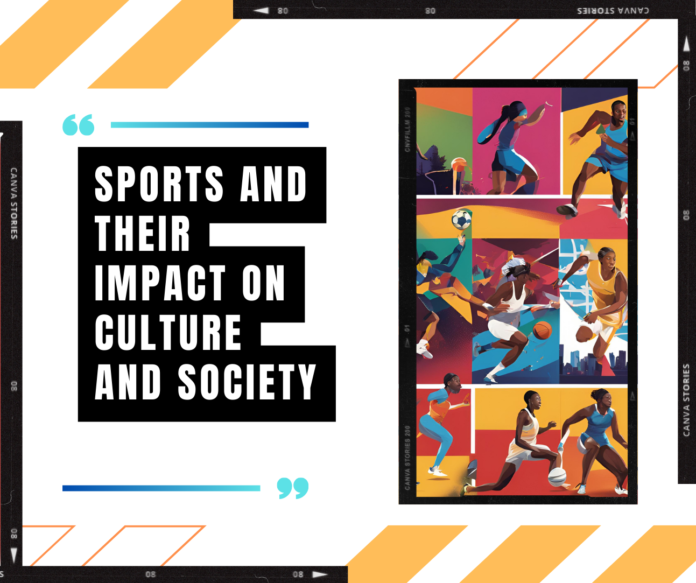Introduction
Sport has played a significant role in human civilization for several millennia, acting as such elements as entertainment, a mirror of values in societies, beliefs in cultures, and identities in communities. From ancient Olympic Games to professional leagues today, sports have left their mark on the geographical and social fabrics of communities across the world.
The following article examines sport’s rich and complex influence on culture and society-from historical roles to newer ways that sport informs identity and incites social change.
Historical context of sport in society
Perhaps this postulation of the influence of sport in culture and society can better be viewed against a backdrop of history. The ancient civilizations of the Greeks and Romans prized physical ability and competitive will in men. Although the Olympic Games, which first took place in 776 BC, glorified athletic perfection, it also was an event that brought together the fragmented city-states of Greece into one unity. As a matter of fact, these ancient sporting events were the foundational structures upon which modern sporting culture has been built.
Athletics thus became part of the social structure and class differences in the Middle Ages: knights held jousting tournaments while common people organized local games. In the period of the Renaissance, interest in physical activities re-awakened when formal sports were created with rules and regulations. It was a transitional movement that transformed sports from informal games of play into organized competition and bridged the gap between classes.
Sports: A Reflection of Cultural Values
Sports tend to reflect many of the values and sentiments of a society. Through sports, the teamwork, discipline, and perseverance considered to be white values are expressed within many cultures of the world. In team sports such as soccer and basketball, the overall message is one of collaborative effort, whereas in individual sports such as tennis and swimming, it’s one of personal dedication and staying power.
Additionally, sports could be one way to express one’s cultural identity. For example, kabaddi in India and hurling in Ireland are traditional sports united not only to entertain people but also to retain the history of bygone days. Such sports bind people with their glorious past and give them an identity. Sports therefore become a medium to express and rejoice in cultural stories. Sport and the Shaping of Identity
Sports are a principal means through which personal and collective identities are created. In the case of many individuals, involvement in sports allows the individual to determine things like one’s self-esteem and identity. Many athletes are role models in every sense, encouraging the young generation to pursue their ambitions. This is no better testified than in youth sports, which may nurture social skills, leadership qualities, and community.
On a larger scale, sports can act to unify the different elements of society together. Major events at any level, such as FIFA World Cup or Olympic events bring people of different statuses together and fetes pride for one’s home country. The occasion becomes communal memory shared by people that come together in the spirit of reveling in their identity as fans and supporters.
Social Change via Sports
Sports have been an inspirational force for change in society throughout history. Many athletes have taken up the mantel to speak about causes and issues that have dearly contributed to the hearts of all people in society, further challenging norms and calling for movement. The U.S. civil rights movement saw some of its most visible athletes rise against racial injustice, including Muhammad Ali and Jackie Robinson.
This courage and activism advanced causes, mobilized public opinion, and inspired future generations. Sport is also a major tool to unleash the potential and achieve the overcoming of social inequalities. “Sport for Development” programs use sport as a tool, training in health and social cohesion for the inhabitants of less fortunate communities. These give access to sports activities, which help them feel empowered as active agents of change.
The Globalization of Sports
Sport has become an international phenomenon without borders; with today’s interdependence of the world, it is hard to maintain borders. Globalization in sports created avenues through which practices and values are transferred from culture to culture, enriching each society while bringing other challenges. Large international activities such as the Olympics and World Cup demonstrate culture and create a site for global unity.
The commodification of sports, or the process in which cultural practices are commercialized and sometimes watered down, is perhaps the less-than-desirable feature of globalization. Primarily, this has taken a new turn where growth in sports marketing and sponsorship seems to raise, at times, questions of authenticity and cultural integrity as regards how sports are looked upon and consumed. In fact, one of the most salient challenges today facing sports itself is how to match the opposite ends of globalization with the preservation of cultural values.
The Future of Sports and Society: Where Will It Take Us?
With this line, the influence of sports on culture and society will no doubt continue to change as time progresses. Technology will irrevocably change the dynamic with which we initiated interaction with sports, from Virtual Reality to data analytics. These changes could further enhance fan involvement and participation by opening up new avenues to connect.
The playing field is evening out, so to say, with the rise in diversity and inclusion within sports. Initiatives of gender equality, LGBTQ+ rights, and accessibility for the disabled grow in popularity. If this were anything to go by, it would be safe to assume that as society advances further, sports will be very paramount in support of this cultural shift toward a more inclusive atmosphere.
Conclusion
Sport is a meaning that seeps into the fabric of culture and society in a really deep and multi-dimensional way.
It is obvious that sports continue to shape identities and reflect the values of a culture and community. In fact, as we forge further ahead in this world of growing globalization, the challenge now would be how to tap into the power of sport for good while preserving that richness in cultural narratives that make us distinctive.
The future viewed for sports is bright and full of enthusiasm, and this explains why sporting activities are deemed to remain one of the social vehicles for many years in the future.
Frequently Asked Questions (FAQs)
How does sport reflect cultural values?
Sports are a reflection of cultural values because they work in unison through teamwork, discipline, and hard work; all these are attributes present in most societies.
What does sport have to do with anything in history? It has played a very significant and multi-dimensional role through the ages, from ancient Olympic Games to the contemporary ones, while it shapes social formations and cultural identities.
How do sports shape personal identity? Participating in sport develops a sense of self-esteem and belonging, while athletes are often role models for people, especially the youth.
Does sport have a role in social reform?
More often than not, athletes have used their platforms to raise awareness of social issues and rally movements for change.
What influence does globalization have on sporting activities?
The value of globalization practices within sports has brought about cultural practice exchanges but questions commodification and cultural integrity on the other side.
How do major sporting events substitute for communal sensation?
Events at the international level make everyone, irrespective of background, share moments binding them through a very strong sense of national pride and cohesion.
What place will technology have in the future of sports?
Technology definitely alters the patterning of the engagement and participation of fans through opening up new avenues of affiliation and interaction.
How do sports promote inclusion?
The initiatives placed on gender equality and accessibility create opportunities in the sporting arena among diverse persons.
What is the importance of traditional sports?
Traditional games are probably included in their culture, which enables them to feel like they belong to a group.
How do sports give support and build a community?
Sport programs have the natural potential to be the tool for education, health, or social cohesion, thus empowering residents of the most disadvantaged areas. What does globalization demand from sports? But on the other hand, due to the implications brought by globalization, it made sports fall into commodification and thus be inauthentic in cultural practice. The perception of the public is shaped by how the athletes present themselves. The more illustrious the athletes, the more these platforms can be used to raise social issues to the fore that incite public discourse. What is the link of sports with national identity? Almost always, sports have been vehicles whereby the pride of the nation is unfolded through which the bonds among its citizens are forged as one similar identity. How do sports address social inequalities? Initiatives like “Sport for Development” do indeed offer routes into sport programs with a view to combating issues of marginalization. What does youth sports really mean in society in general? Youth sports develop social skills, leadership, and a sense of community. Character builds youths. In what way are cultural narratives observable in sports? Sports can also be carriers of cultural stories in the forms of traditional games and rituals, uniting communities with the past. How do sponsorships affect sports? Sponsorships might render this one of commercialization and questions of cultural integrity. How do sports enable people to participate in social life? Sports bring people together and create avenues for them to be sociable and accepted. What is competed for in sports that promotes mental health? The feeling of acceptance and a sense of achievement through sport participation can be therapeutic in making one feel part of the community. In relation to changes in society, how are sports changed? It is changing while the society is developing, according to values and principles included in it; therefore, the sport environment should be more inclusive and diverse.









































